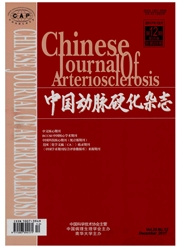

 中文摘要:
中文摘要:
脂肪酸合酶是催化内源性脂肪酸合成的关键酶,由其介导生成的饱和脂肪酸是动脉粥样斑块的构成成分之一。脂肪酸合酶还通过影响巨噬细胞对氧化低密度脂蛋白的摄取及胆固醇流出,参与粥样斑块的形成。此外,脂肪酸合酶参与脂类代谢,抑制该酶活性具有减轻体重、增加胰岛素敏感性等作用,可使肥胖、糖尿病等冠心病的危险因素逆转,因此,脂肪酸合酶与冠心病的发生发展密切相关。
 英文摘要:
英文摘要:
Deregulation of fatty acid synthase(FASN) catalyzed de novo fatty acids biogenesis could play a central role in the pathogenesis of atherosclerosis.We reviewed pharmacological and genetic alterations of FASN activity that have been shown to significantly influence artherosclerosis and its risk factors including obesity,type 2 diabetes.First,the endogenous fatty acids which are catalyzed by the key enzyme FASN are one of atherosclerotic plaque compositions.Secondly,FASN influences the oxidized low density lipoprotein intake and cholesterol efflux in macrophage,which would absolutely affect the plaque formation.Thirdly,FASN plays a key role in monocytes differentiation.Inhibitting FASN may reduce the formation of foam cells.In addition,FASN involved in lipid metabolism is also associated with metabolic diseases,such as obesity and diabetes which are the risk factors for coronary heart disease.We propose that the development or the progression of artherosclerosis can be prevented or reversed by the modulation of FASN status.The use of FASN inhibitors might be a valuable therapeutic approach for coronary disease.
 同期刊论文项目
同期刊论文项目
 同项目期刊论文
同项目期刊论文
 Evaluation of the lipid lowering ability, anti-inflammatory effects and clinical safety of intensive
Evaluation of the lipid lowering ability, anti-inflammatory effects and clinical safety of intensive 期刊信息
期刊信息
